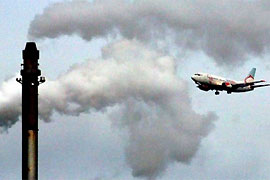US to protect polar bears
Environmentalists say the move may mark a new US commitment to the natural world.

Published On 28 Dec 2006
Listing the white bears, one of the two largest species of bears, as threatened would force government agencies to ensure they take no action that jeopardizes the animal’s existence.
That in turn could pressure the government to consider tougher measures to clean up the air because most scientists believe carbon dioxide emissions cause global warming.
“We are making this proposal because a scientific review of the species by the fish and wildlife service found that populations may be threatened by receding sea ice, which polar bears use as a platform for many activities essential to their life cycle, including hunting for their main prey, Arctic seals,” Kempthorne said.
Activists praise decision
The action by the service, which had been sued by environmental groups, starts a period of public comment and scientific review before a final decision in 12 months over whether to list the polar bear as threatened.
The only wild polar bears in the United States live in Alaska.
“Global warming is the single biggest threat to polar bears’ survival, and this will require the government to address the impacts on the polar bear,” said Andrew Wetzler, a senior attorney with natural resources defence council, which sued the government to protect the bear.
Scientists have concluded that global warming is caused mainly by heat-trapping carbon dioxide emissions from power plants and motor vehicles.
The US is the largest producer of those pollutants worldwide.
A ‘sea change’ in government’s approach
 |
| US environmentalists say that global warming is melting Arctic ice [EPA] |
Environmental groups praised Wednesday’s announcement and said it could mark a new direction for the Bush government.
“This is a victory for the polar bear, and all wildlife threatened by global warming,” said Kassie Siegel of the center for biological diversity, which also sued the fish and wildlife service.
“This is the beginning of a sea change in the way this country addresses global warming. There is still time to save polar bears but we must reduce global warming pollution immediately.”
There are 20,000 to 25,000 polar bears alive today.
A Canadian group of polar bears, one of the most widely studied, has seen a substantial decline in recent years, but officials said on Wednesday that the Alaskan polar bears had not suffered a statistically significant decline.
Source: News Agencies